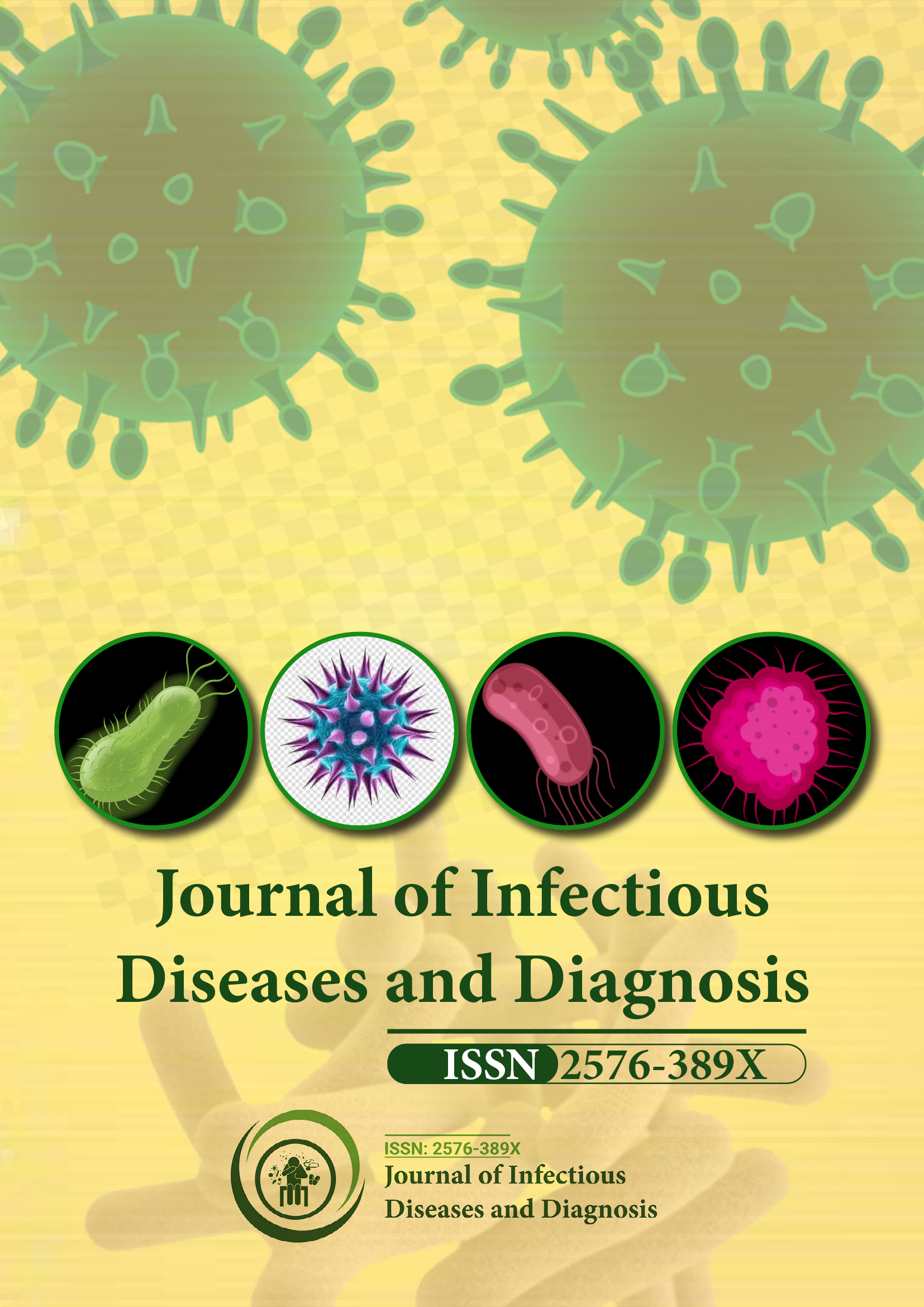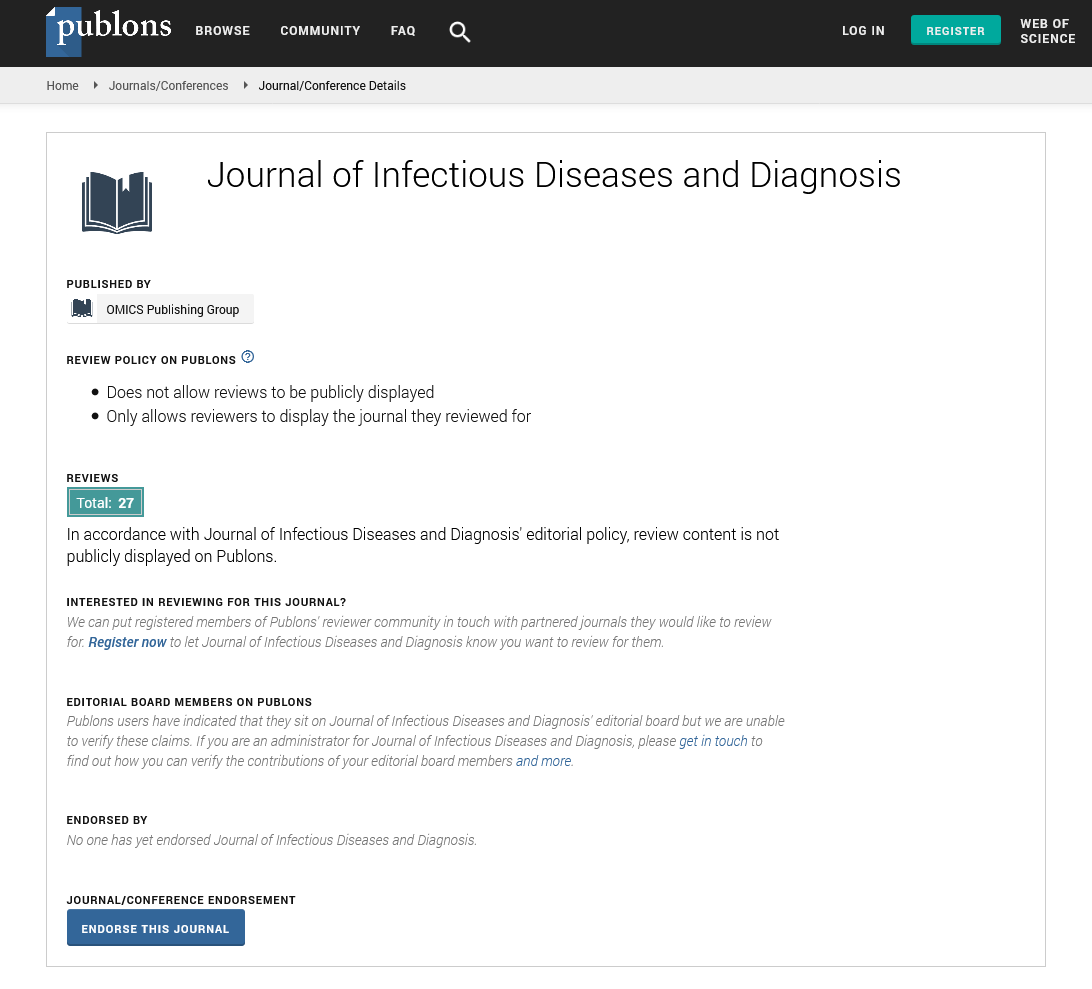Indexed In
- RefSeek
- Hamdard University
- EBSCO A-Z
- Publons
- Euro Pub
- Google Scholar
Useful Links
Share This Page
Journal Flyer

Open Access Journals
- Agri and Aquaculture
- Biochemistry
- Bioinformatics & Systems Biology
- Business & Management
- Chemistry
- Clinical Sciences
- Engineering
- Food & Nutrition
- General Science
- Genetics & Molecular Biology
- Immunology & Microbiology
- Medical Sciences
- Neuroscience & Psychology
- Nursing & Health Care
- Pharmaceutical Sciences
Perspective - (2024) Volume 9, Issue 3
Immune Pressure and the Evolution of More Virulent Parasite Strains
Sara Tyler*Received: 01-May-2024, Manuscript No. JIDD-24-26004; Editor assigned: 03-May-2024, Pre QC No. JIDD-24-26004 (PQ); Reviewed: 20-May-2024, QC No. JIDD-24-26004; Revised: 27-May-2024, Manuscript No. JIDD-24-26004 (R); Published: 03-Jun-2024, DOI: 10.35248/2576-389X.24.09.270
About the Study
The interaction between host immunity and parasite evolution is a dynamic and complex relationship that shapes the pathogenesis and severity of infectious diseases. Host immunity, through various mechanisms, applies selective pressure on parasites, prompting them to evolve in ways that can increase their virulence. This escalation in parasite virulence is not merely a consequence of random mutations but a directed response to the host's immune defenses. Understanding how host immunity drives the evolution of parasite virulence is essential for developing effective strategies to manage and mitigate infectious diseases.
When a host's immune system detects and combats a parasitic infection, it employs a variety of defenses. These include the innate immune response, which provides immediate but nonspecific defense, and the adaptive immune response, which develops a targeted attack against the parasite. Both responses can exert selective pressure on parasites, leading to an evolutionary arms race. In this context, parasites that can evade or resist immune defenses are more likely to survive and reproduce, passing on their advantageous traits to subsequent generations.
One mechanism by which host immunity escalates parasite virulence is through immune-mediated selection. For example, when a parasite is recognized and attacked by the host's immune system, variants of the parasite that can avoid detection or withstand immune attacks have a survival advantage. These variants might possess mutations that alter surface antigens, making them less recognizable to the host's immune cells. Over time, this selective pressure can lead to the emergence of parasite strains that are more virulent, as they can evade immune detection and cause more severe disease.
Additionally, host immunity can drive the evolution of parasite strategies that increase transmission potential. Parasites that cause more severe symptoms might have an increased likelihood of spreading to new hosts. For instance, respiratory pathogens that induce severe coughing can enhance their transmission via aerosols. Similarly, gastrointestinal parasites that cause diarrhea can spread more effectively through contaminated water sources. Thus, in response to immune pressure, parasites may evolve to exploit transmission routes that enhance their spread, even if this increases the harm to the host.
The concept of immune escape also plays a significant role in the evolution of parasite virulence. Immune escape refers to the ability of parasites to avoid being targeted by the host's immune system. This can be achieved through antigenic variation, where parasites frequently change their surface proteins to avoid immune recognition. Parasites like Plasmodium falciparum, which causes malaria, and Trypanosoma brucei, responsible for African sleeping sickness, utilize antigenic variation to persist in the host and maintain chronic infections. This constant evasion tactic forces the host's immune system to continuously adapt, creating a cycle of escalating virulence.
Host immunity not only selects for more virulent parasites but can also lead to the evolution of parasite strategies that manipulate the host's immune response. Some parasites have evolved mechanisms to modulate or suppress the host's immune system to create a more favorable environment for their survival and replication. For example, certain helminths (parasitic worms) release molecules that reduce the host's inflammatory response, reducing tissue damage and prolonging the infection. This immunomodulation can lead to a delicate balance where the parasite thrives without killing the host too quickly, allowing for sustained transmission.
The interaction between host immunity and parasite evolution has significant implications for public health and disease management. Vaccination and other immune-based interventions can inadvertently drive the evolution of more virulent strains if they do not confer complete immunity. This phenomenon, known as vaccine-driven virulence, underscores the importance of designing vaccines that target multiple stages of the parasite's life cycle or elicit broad, cross-protective immune responses. Additionally, understanding the evolutionary pressures exerted by host immunity can inform the development of novel therapeutics that minimizes the risk of selecting for more virulent parasite strains.
Conclusion
In conclusion, host immunity plays a critical role in escalating the evolution of parasite virulence. Through mechanisms such as immune-mediated selection, immune escape, and immune modulation, parasites adapt to the selective pressures imposed by the host's defenses. This evolutionary arms race can lead to the emergence of more virulent and transmissible parasite strains, posing challenges for disease control and prevention. By studying these interactions, researchers can develop more effective strategies to manage infectious diseases and mitigate the impact of evolving parasite virulence.
Citation: Tyler S (2024) Immune Pressure and the Evolution of More Virulent Parasite Strains. J Infect Dis Diagn. 9:270.
Copyright: © 2024 Tyler S. This is an open-access article distributed under the terms of the Creative Commons Attribution License, which permits unrestricted use, distribution, and reproduction in any medium, provided the original author and source are credited.

